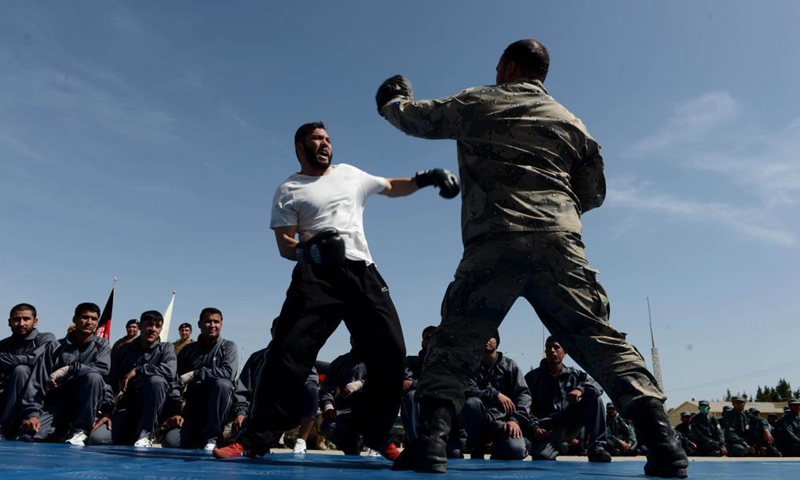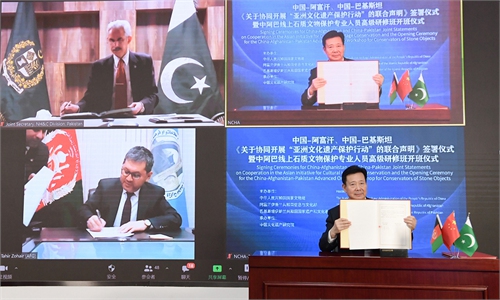China, Central Asian countries to strengthen cooperation on Afghan issue, counterterrorism and diversify energy sources
US troop pullout ‘could leave a mess,’ regional security ties should be strengthened

Security force members attend a training in Herat Province, Afghanistan, on April 21, 2021.Photo:Xinhua
China and its Central Asian partners will strengthen cooperation on fighting "Three Evils" - terrorism, separatism and religious extremism - in the future to safeguard the regional peace and stability after US military troops withdraw from Afghanistan, as the pullout could leave chaotic situations and the region could become a breeding ground for "Three Evils," said Chinese experts, as the second China + Central Asia (C+C5) foreign ministers meeting took place.
Chinese State Councilor and Foreign Minister Wang Yi on Wednesday held talks with his counterparts from five Central Asian countries - Kazakhstan, Uzbekistan, Tajikistan, Kyrgyzstan and Turkmenistan - most of which are also members of the Shanghai Cooperation Organization (SCO), in Xi'an, capital of northwest China's Shaanxi Province.
Wang chaired the multilateral meetings and also held bilateral talks with relevant countries to discuss issues covering fighting coronavirus, energy, security, the Belt and Road Initiative, trade and law-enforcement against transnational organized crimes, according to the Chinese Foreign Ministry's website on Wednesday. China and the five Central Asian countries also released a joint statement on dealing with the COVID-19 pandemic.
Clean the mess
Since the US announced it will pull out its troops from Afghanistan by September 11, the Afghanistan issue is becoming a hot topic that has attracted attention worldwide, not only among the US' NATO allies, but also from neighboring countries of Afghanistan, including China. Wang elaborated China's position on Afghan situation at the C+C5 meeting.
China believes that "foreign troops should withdraw from Afghanistan in an orderly and responsible manner to prevent any hasty action from adversely affecting and seriously interfering with the peace and reconciliation process in Afghanistan," said the Chinese foreign minister.
Wang said that it is necessary for neighboring countries of Afghanistan, including Uzbekistan and Tajikistan, to coordinate their positions in a timely manner, speak with one voice, and fully support the Afghan domestic peace process to overcome difficulties and move forward, the Xinhua News Agency reported on Wednesday.
According to the Wall Street Journal on Saturday, US military planners are looking for options to base forces and equipment in Central Asia and the Middle East after American and allied troops leave Afghanistan in the coming months.
Preferable, according to some military and Biden administration officials, would be Uzbekistan and Tajikistan, which border Afghanistan and would allow for quick access. But Russia's large military footprint in the region, China's growing one and tensions between them and Washington complicate plans for Central Asian bases, the officials said.
"This plan will surely be opposed by China and Russia due to the intense relations between the US and these two major powers. And Central Asian countries will also be reluctant to host US military deployment on their soil," Yang Jin, an expert at the Institute of Russian, Eastern European and Central Asian Studies at the Chinese Academy of Social Sciences, told the Global Times on Wednesday.
When the US launched its Global War on Terror in 2001, Russia and regional countries allowed US and NATO troops to enter Central Asia, but in 2014, the US handed back its only Central Asian airbase to the government of Kyrgyzstan. Now, US and NATO officials want to return to the region again to maintain its military presence.
Yang said "the reason why the cooperation between the US and Central Asian countries won't last long is that US military presence will also increase US political and intelligence activities in relevant countries. US diplomats and agents will increase the connections with local opposition parties to train and sponsor NGOs and media groups to serve the goal of color revolution."
To overthrow local governments and let pro-US forces control the region could maximize US strategic interests in the region. So on the one hand, the Kyrgyz government has allowed the US to build a military airbase on its soil; on the other hand, the government also experienced a US-backed color revolution in 2005, and other countries in the region like Kazakhstan have also felt the impact, Yang noted. "In general, US troops are not very welcome in the region."
Fighting Three Evils
However, the US troops' hasty pullout could also cause new problems, and Chinese experts worried that the current Afghan government is unable to ensure the peace process and Afghanistan will face a potential crisis of civil war.
Wang said at the C+C5 meeting that regional countries and the international community hope that "the future Afghan government could implement the moderate Muslim policy and avoid extremist tendencies, oppose all forms of terrorism and not allow the resurgence of terrorist forces in Afghanistan, develop good-neighborliness and friendship with neighboring countries and become a positive factor in promoting regional peace and stability."
As close neighbors of Afghanistan, Central Asian countries should make due contributions to the final settlement of the Afghan issue, and the SCO should also play its role for the long-term peace and stability in Afghanistan, Wang stressed.
Fighting the "Three Evils" is a task for the SCO, and in the future, the SCO could consider letting Afghanistan, which is now an observer, to join the organization, so that SCO members can help the country reinforce its capability in fighting terrorism and extremism, to ensure the stability despite US military pullout, said Song Zhongping, a military expert and TV commentator.
"If the Afghan government and Taliban reach an agreement to form a new government peacefully, then how the new government would deal with the 'Three Evils' is a question, and even if we all hope it could become a moderate Islamic country, we should be prepared for any other possibility," Song noted.
Yang said that the future situation in Afghanistan and beyond won't be very optimistic, as the US has made this region a "breeding ground" for the "Three Evils" and opium poppy growth, and now Washington wants to leave this mess to the regional countries. So the mission for China and Russia, as well as other SCO members, would be tough.
Fortunately, although Russia has always treated Central Asia as its backyard, we hardly heard any voice of concern from Russia when China boosted ties with Central Asian countries, said Yang, adding that unlike the US, China and Russia uphold multilateralism, and they are cooperating in the region rather than competing with each other, and their advantages are complementary, with Russia caring more about security, and China has the economic capability.
"A solid mutual trust and strategic partnership between Beijing and Moscow will benefit the peace and stability in Central Asia."
Energy security
In a meeting with Turkmen senior officials, the two countries agreed to further consolidate and expand cooperation on natural gas, while vigorously exploring cooperation in non-resource fields.
Increasing energy cooperation with Central Asian countries and Russia is a long-standing policy for China, because it can diversify the sources of energy, reduce reliance on some other countries which have unstable or unfriendly ties with China, such as Australia, said some Chinese observers.
China's cooperation with Central Asian countries or Russia will not target any third party, so importing natural gas from Turkmenistan is based on the common interest shared by the two sides rather than driven by China-Australia tensions, but this kind of cooperation will surely bring China more advantages when handling the frictions and struggles with US and its allies, experts noted.




